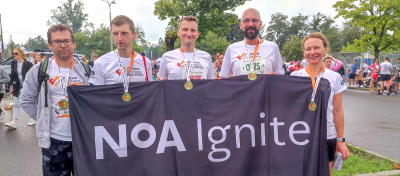Have you ever heard of strength-based development? If you haven’t, you aren’t alone. It was only three years ago when I first heard about this concept during one of the leadership training programs we had in NoA Ignite. Back then I heard that by focusing on my strengths, I could work better, be more productive, and achieve more. We were told that fixing what’s wrong with us won’t help us as much as focusing on what’s right with us. I was shocked and amazed to hear these ideas. It was the opposite of what I had been told before, and I became hooked on this concept.
What is a traditional model?
Ever since I can remember, I was told to focus on what I struggle with. At school, when I had good grades in some subjects and not-so-good grades in others, I was told to pay more attention to the latter. In the corporate world, I’ve experienced the same way of thinking (and many of the people I work with can confirm this). For example, If I wasn’t good at giving presentations, I was sent to training to learn how to get better. There are many other examples of this in the workplace, and I bet you’ve experienced a similar approach. I call this the traditional model of employee development – fixing what is below average, rather than enhancing what is extraordinary. As a result, we have people with fewer weaknesses but average competencies.
What is a Strength?
Before I explain why we can benefit so much from focusing on Strengths, I’ll shed some light on Strengths themselves. What is a Strength, exactly? I’ll quote Gallup’s definition (since I know this methodology the best):
A Strength is the ability to consistently produce a nearly perfect positive outcome in a specific task.
Strengths require these three ingredients:
- Talent – ”A natural way of thinking, feeling, or behaving.” Talents are innate. - Skill – ”The basic ability to move through the fundamental steps of tasks.” Skills can be acquired through training. - Knowledge – ”What you know. Knowledge can be acquired through education.”
It all starts with a Talent. With the introduction of Skills and Knowledge, you can develop your Talent. If you have all three of these, you can say you have a Strength – an ability to consistently produce nearly perfect positive outcomes.
Thus, we have the following equation:
Talent (a natural way of thinking, feeling, or behaving) × Investment (time spent practicing, developing your skills, and building your knowledge base) = Strength (the ability to consistently provide near-perfect performance)
Why focus on Strengths?
Part of the answer to this question is in the definition of a Strength itself. We want to have the ability to consistently produce nearly positive outcomes. And we know that we have much greater chances to achieve this when we discover our Talents and find roles that allow us to work using our Talents. It’s as simple as that. We just aren’t able to achieve the same results by trying to correct our weaknesses. At most, we’ll have average capabilities. We should focus on what we are good at, work on it, and excel at it, because that’s where our biggest potential lies.
What do we mean when we say we focus on Strengths? There are many areas within our everyday work where we can utilize our Strengths:
- Focus on Talents
When someone takes the StrengthsFinder test and discovers his/her top five Talents, he/she will get help in understanding what those Talents are, how they have been utilized so far, and how they can be developed in the future. The aim is to be able to use them in reaching goals, solving problems, and having better communication.
- Use Talents in everyday communication
By understanding my own Talents and those of my interlocutor, I am aiding myself in communicating with that person. This knowledge helps me in giving feedback, delegating tasks, asking for feedback, and much more. We work on demonstrating this to all of the employees at Making Waves.
- Use Talents in project teams and departments
A team can greatly benefit from knowledge of its members’ Talents. With this knowledge, members have a better idea of who can take on what role, how communication should be approached within the team, and how potential issues should be solved during the project. All this can be done by showing the team what Talents are available in the team.
We haven’t fully implement this approach yet, but more and more employees are becoming aware of their Strengths. The feedback we have gotten so far is very promising. And we’re working towards becoming a more fully strength-based team here at Making Waves.
Where can you learn more about strength-based development?
There are many places where you can learn more about strength-based development. There isn’t one common methodology or approach to this subject. However, all of the methods I’ve worked with are based on positive psychology. I can recommend two methods that I’ve worked with extensively:
- Gallup’s StrengthsFinder 2.0
I’m the Gallup Certified Strength Coach and I’m most familiar with this method. It’s very practical and oriented toward productivity and efficiency. It allows you to name your Talents and can also be used for areas outside of work – I’ve employed Gallup techniques in my own private life with much success.
- ViaCharacters
This is another strength-based development methodology that allows you to discover and name your core characteristics, study them, and use them more consciously.
I suggesting reading more about both methodologies and deciding which one is most useful for you – you can even try using them together, as they are complementary.
Summary
If you remember only one thing from this blog post, I’d love it to be this quote from StrengthsFinder 2.0:
“What’s more, we had discovered that people have several times more potential for growth, when they invest energy in developing their Strengths instead of correcting their deficiencies.”
Tom Rath
Focus on your Strengths – there lay the most opportunities to succeed!
Author
Related articles
![image of blured woman walking in the office]()
April 29, 2024 / 3 min read
Mobbing is on the rise; here’s how we prevent it at NoA
What we thought unthinkable in today’s workplace which is increasingly focused on equality, diversity, and social inclusion – is happening. We are talking about the rise of mobbing.
![NoA Ignite's team on Poland Business Run]()
January 4, 2024 / 2 min read
Sharing is caring: NoA’s 2023 CSR initiatives
As the year comes to an end, we all naturally reflect on it. We ask ourselves, "What good have I done this year?" At NoA, we're no different. Let's take a look at some of the...




